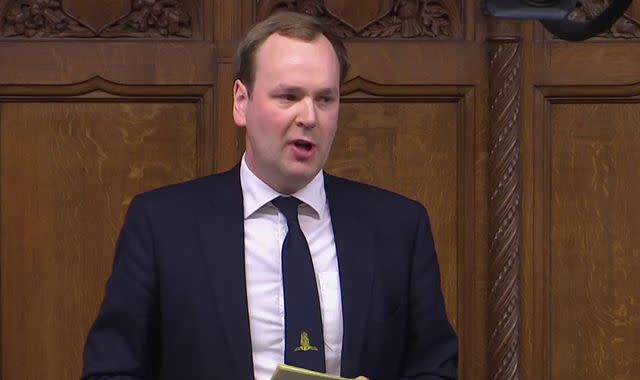Jeremy Hunt praises William Wragg for 'courageous' apology after admitting to sharing MPs' phone numbers with dating app contact

The chancellor has praised Tory MP William Wragg for offering a "courageous and fulsome" apology after admitting to The Times he shared MPs' personal phone numbers.
Jeremy Hunt said the news had been a "great cause for concern".
It comes as the Metropolitan Police said it was assessing reports of a parliamentary honeytrap sexting scam.
Mr Wragg said he was "manipulated" into giving the personal numbers of colleagues to a man he met on a dating app.
Politics latest: MPs 'left in dark' over Israel legal advice, claims Labour
Speaking to reporters in Guildford, Mr Hunt said: "The MP involved has given a courageous and fulsome apology, but the lesson here for all MPs is that they need to be very careful about cyber security."
However not all politicians have been as sympathetic. Labour London Mayor Sadiq Khan told Politico that Mr Wragg should quit - if the prime minister doesn't sack him first.
He told the news website: "I think it's now at a stage where, as a legislator, he should resign. I think there's also a question about Rishi Sunak's judgement."
Read more: Who is William Wragg?
Mr Wragg, the Conservative MP for Hazel Grove and a select committee chair, made the admission to The Times on Thursday evening.
He told the newspaper: "They had compromising things on me. They wouldn't leave me alone.
"They would ask for people. I gave them some numbers, not all of them. I told him to stop. He's manipulated me and now I've hurt other people.
"I got chatting to a guy on an app and we exchanged pictures. We were meant to meet up for drinks, but then didn't.
"Then he started asking for numbers of people. I was worried because he had stuff on me. He gave me a WhatsApp number, which doesn't work now. I've hurt people by being weak.
"I was scared. I'm mortified. I'm so sorry that my weakness has caused other people hurt."
There have been reports this week that a serving minister, some MPs, party staffers and political journalists were among those who received unsolicited messages from two unknown WhatsApp users.
A Leicestershire Police spokesperson said they were investigating a report of malicious communications after a number of unsolicited messages were sent to a Leicestershire MP last month.
Wragg 'showed maturity and common sense' in apologising
Mr Wragg, 36, who has previously announced he will stand down at the next election, also received support from fellow Conservative MP Mark Garnier.
Mr Garnier told Sky News: "I think everybody would accept, including William, that he's made a mistake, but I think William has come forward in a very dignified way to make a statement about this to The Times."
He said Mr Wragg, who is also the vice chairman of the 1922 committee of backbench Conservative MPs, had shown "maturity and common sense" by "coming forward in order to try and help as best he probably can".
Asked whether such "honeytraps" were a common experience for MPs, Mr Garnier said they were.
MPs 'of massive interest' to hostile states
Richard Dearlove, a former chief of MI6, told Sky News that Mr Wragg's behaviour was "so stupid from a security point of view it doesn't warrant a serious commentary".
He added: "Any MP is massively of interest to a hostile foreign intelligence service. Not necessarily for the collection of secrets, but for providing insights into the behavioural vulnerabilities of colleagues."
Philip Grindell, the lead specialist of the parliamentary and diplomatic protection team at the House of Commons, said politicians get plenty of training and advice on things like "honey trapping" and the biggest threat to MPs "is that they become complacent".
He said there had been a "bit of an overreaction" to the story, as the texts do not appear to amount to "a cyber security breach or anything of that nature".
"It could be something that started quite innocent and then it might be somebody realising who this person is and taking advantage of that scenario. It could well be a state actor. It could well be a professional criminal."
Read more:
Former minister faces Tory investigation over Israel comments
Deadline forcing MP to name whistleblowing soldiers extended
Julian Richards, professor of intelligence studies at the University of Buckingham, said the matter should be taken "very seriously" as "there will be a very, comprehensive set of attacks of this nature being attempted all the time by a range of hostile states".
He said an obvious solution was to stop officials having personal mobile devices "but that's virtually impossible to implement".
Sky News understands that Mr Wragg will not lose the party whip over the matter, meaning he can remain in the Conservative parliamentary party.
A parliamentary spokesperson said: "Parliament takes security extremely seriously and works closely with government in response to such incidents.
"We provide members and staff with tailored advice, making them aware of security risks and how to manage their digital safety. We are encouraging anyone affected who has concerns to contact the parliamentary security department."


